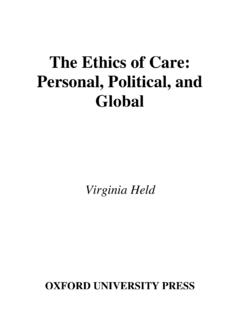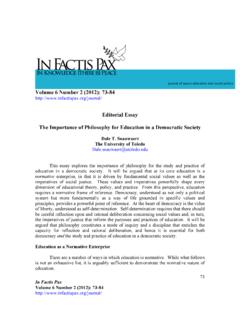Transcription of Analysing Political Discourse - Void Network
1 Analysing Political Discourse Analysing Political Discourse is a must for anyone interested in the way language is used in the world of politics. Invoking Aristotle's idea that we are all Political animals, able to use language to pursue our own ends, the book uses the theoretical framework of linguistics to explore the ways in which we think and behave politically. Domestic and global politics come under the linguistic microscope. What do politicians really do in a radio interview? What verbal games do they play in a parliamentary knock-about?
2 Contemporary and high-pro le case studies are used, including an examination of the dangerous in uence of a politician's words on the defendants in the Stephen Lawrence murder trial. International in its perspective, Analysing Political Discourse also considers the changing landscape of global Political language post-September 11, focusing on self-legitimising language and the increasing use of religious imagery in Political Discourse . Bill Clinton's address persuading his country to go to war in Kosovo is analysed, and speeches by George Bush and Osama bin Laden are examined in relation to each other.
3 Written in a lively and engaging style, Analysing Political Discourse offers a new theoretical perspective on the study of language and politics, and provides an essential introduction to Political Discourse analysis. Paul Chilton is Professor of Linguistics at the University of East Anglia, where Critical Linguistics was pioneered. His previous publications include Orwellian Language and the Media (1988), Security Metaphors (1996) and (co-edited with Christina Sch ffner) Politics as Text and Talk (2002). Allie Analysing Political Discourse Theory and practice Paul Chilton First published 2004.
4 By Routledge 11 New Fetter Lane, London EC4P 4EE. Simultaneously published in the USA and Canada by Routledge 29 West 35th Street, New York, NY 10001. Routledge is an imprint of the Taylor & Francis Group This edition published in the Taylor & Francis e-Library, 2004. 2004 Paul Chilton All rights reserved. No part of this book may be reprinted or reproduced or utilised in any form or by any electronic, mechanical, or other means, now known or hereafter invented, including photocopying and recording, or in any information storage or retrieval system, without permission in writing from the publishers.
5 British Library Cataloguing in Publication Data A catalogue record for this book is available from the British Library Library of Congress Cataloging in Publication Data Chilton, Paul A. (Paul Anthony). Analysing Political Discourse : theory and practice / Paul Chilton. p. cm. Includes bibliographical references. 1. Language and languages Political aspects. 2. Great Britain . Languages Political aspects. I. Title. 2004. dc21 2003011976. ISBN 0-203-56121-X Master e-book ISBN. ISBN 0-203-34425-1 (Adobe eReader Format). ISBN 0 415 31471 2 (hbk).
6 ISBN 0 415 31472 0 (pbk). To my father and to the memory of my mother Allie Contents List of gures and tables viii Preface ix Acknowledgements xiii PART I. Political animals as articulate mammals 1. 1 Politics and language 3. 2 Language and politics 16. 3 Interaction 30. 4 Representation 48. PART II. The domestic arena 67. 5 Political interviews 69. 6 Parliamentary language 92. 7 Foreigners 110. PART III. The global arena 135. 8 Distant places 137. 9 Worlds apart 154. 10 The role of religion 173. PART IV. Concluding thoughts 195.
7 11 Towards a theory of language and politics 197. Appendix 206. Notes 207. Bibliography 213. Name index 221. Subject index 224. Figures and tables Figures Dimensions of deixis 58. The rightness-wrongness scale 60. Presupposed propositions 124. Deictically speci ed reality spaces 141. Events located on spatial, temporal and modal axes 144. Metaphor supporting inferences concerning events remote from centre 147. Metonymic relations and analogy inference 151. Relative distances from we' 159. Relative distances in geopolitical space 162.
8 Distance and deictic polarisation in Bush text 163. Polarisation, conditionals and metaphor (sentences 25 6) 164. Distance and deictic polarisation in bin Laden text (spatial dimensions) 167. Distance and deictic polarisation in bin Laden text (spatial, temporal, modal) 168. Moral value vocabulary in bin Laden text 171. Tables Propositional representations 55. Presumed knowledge in a Political interview 81. Embedding of propositions in interview talk 83. Interpreted strategies in Powell's Rivers of Blood' speech 111. Propositional structure in a portion of Powell's Rivers of Blood' speech 120.
9 Propositional structure in a portion of xenophobic talk (Lawrence Inquiry transcript) 131. Presumed knowledge in Bush text 177. Presumed knowledge in bin Laden text 179. Preface Remember that politics, colonialism, imperialism and war also originate in the human brain Vilayanur S. Rmachandran The analysis of Political Discourse is scarcely new. The western classical tradition of rhetoric was in its various guises a means of codifying the way public orators used language for persuasive and other purposes. The Greco-Roman tradition regarded humans as both creatures who are de ned by the ability to speak and creatures de ned by their habit of living together in groups.
10 For writers like Cicero the cultivation of the power of speech was the essence of the citizen's duty. For others it was the essence of deception and distortion. In eighteenth- century Europe, the new scienti c minds began to distrust deeply the things language could do. Rhetoric as the study of the forms of verbal persuasion and expression declined. But of course orators, politicians, preachers and hucksters of all sorts continued to use their natural rhetorical talents as before. Rhetorical practice, in the form of public relations and spin', fuelled by the media explosion, is now more centre stage than ever.








